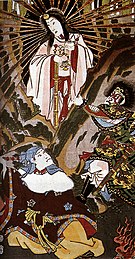Kushinadahime
Appearance
| Kushinadahime | |
|---|---|
Goddess of rice, agriculture, marriage, love, childbirth, and child rearing
| |
 Susanoo and Kushinadahime, by Yoshitoshi
| |
| Other names | Kushiinadahime (奇稲田姫) Inadahime (稲田媛) Makamifuru-Kushiinadahime (真髪触奇稲田媛) Kushiinada-Mitoyomanurahime-no-Mikoto (久志伊奈太美等与麻奴良比売命) |
| Japanese | 櫛名田比売 |
| Major cult center | Susa Shrine, Yaegaki Shrine, Suga Shrine, Hikawa Shrine, Yasaka Shrine, Hiromine Shrine, Kushida Shrine (Saga), Kushida Shrine (Toyama) and others |
| Texts | Kojiki, Nihon Shoki, Izumo Fudoki, Sendai Kuji Hongi |
| Personal information | |
| Parents | Ashimazuchi and Temazuchi |
| Siblings | Unnamed seven sisters |
| Consort | Susanoo |
| Children | Yashimajinumi (Kojiki) Ōnamuchi (Nihon Shoki) |
Kushinadahime (クシナダヒメ), also known as Kushiinadahime (クシイナダヒメ) or Inadahime, is a goddess (kami) in Japanese mythology and in Shinto. She is married Susanoo, who rescued her from the monster Yamata no Orochi. As Susanoo's wife, she is a central deity of the Gion cult and worshipped at Yasaka Shrine.[1]
Family tree
[change | change source]* Pink is female. * Blue is male. * Grey means other or unknown. * Clans, families, people groups are in green.
Related pages
[change | change source]References
[change | change source]- ↑ "Mikogami". Encyclopedia of Shinto. 21 April 2005. Archived from the original on 30 September 2007. Retrieved 29 September 2019.
{{cite web}}: CS1 maint: bot: original URL status unknown (link) - ↑ Atsushi, Kadoya (10 May 2005). "Susanoo". Encyclopedia of Shinto. Retrieved 2010-09-29.
- ↑ "Susanoo | Description & Mythology". Encyclopedia Britannica.
- ↑ Kaoru, Nakayama (7 May 2005). "Ōyamatsumi". Encyclopedia of Shinto. Retrieved 2010-09-29.
- ↑ Fr?d?ric, L.; Louis-Frédéric; Roth, K. (2005). Japan Encyclopedia. Harvard University Press reference library. Belknap Press of Harvard University Press. ISBN 978-0-674-01753-5. Retrieved 2020-11-21.
- ↑ 6.0 6.1 "Encyclopedia of Shinto - Home : Kami in Classic Texts : Yashimajinumi". eos.kokugakuin.ac.jp.
- ↑ "Encyclopedia of Shinto - Home : Kami in Classic Texts : Kushinadahime". eos.kokugakuin.ac.jp.
- ↑ "Kagutsuchi". World History Encyclopedia.
- ↑ Ashkenazi, M. (2003). Handbook of Japanese Mythology. Handbooks of world mythology. ABC-CLIO. p. 213. ISBN 978-1-57607-467-1. Retrieved 2020-11-21.
- ↑ Chamberlain, B.H. (2012). Kojiki: Records of Ancient Matters. Tuttle Classics. Tuttle Publishing. ISBN 978-1-4629-0511-9. Retrieved 2020-11-21.
- ↑ Herbert, J. (2010). Shinto: At the Fountainhead of Japan. Routledge Library Editions: Japan. Taylor & Francis. p. 402. ISBN 978-1-136-90376-2. Retrieved 2020-11-21.
- ↑ Philippi, Donald L. (2015). Kojiki. Princeton University Press. p. 92.
- ↑ Chamberlain (1882). Section XX.—The August Ancestors of the Deity-Master-Of-The-Great Land.
- ↑ Atsushi, Kadoya; Tatsuya, Yumiyama (20 October 2005). "Ōkuninushi". Encyclopedia of Shinto. Retrieved 2010-09-29.
- ↑ Atsushi, Kadoya (21 April 2005). "Ōnamuchi". Encyclopedia of Shinto. Retrieved 2010-09-29.
- ↑ Atsushi, Kadoya (28 April 2005). "Kotoshironushi". Encyclopedia of Shinto. Retrieved 2010-09-29.
- ↑ Tanigawa Ken'ichi 『日本の神々 神社と聖地 7 山陰』(新装復刊) 2000年 白水社 ISBN 978-4-560-02507-9
- ↑ Kazuhiko, Nishioka (26 April 2005). "Isukeyorihime". Encyclopedia of Shinto. Retrieved 2010-09-29.
 |
|
|
Mythic Texts and Folktales:
|
